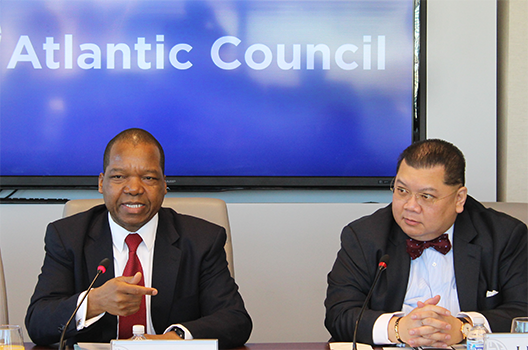On Wednesday, April 18, the Atlantic Council’s Africa Center hosted a roundtable with Dr. John Panonetsa Mangudya, governor of the Reserve Bank of Zimbabwe (RBZ).
Dr. Mangudya presented a summary of Zimbabwe’s macroeconomic environment, highlighting a declining inflation rate, more diversified exports, and excellent human capital within the context of recent political and economic change. He elaborated numerous opportunities for investment and growth in Zimbabwe, including unexploited mineral deposits—particularly gold and platinum—and significant tourism potential.
Dr. Mangudya also outlined the Reserve Bank’s strategy to re-engage the international community and settle debts. He proposed an agreement whereby Zimbabwe would be able to employ the debt-snowball method, first paying off its smaller obligations to the African Development Bank and subsequently addressing the larger arrears owed to the Paris Club and World Bank with credit facilities that would be unlocked by the earlier settlements. He called for increased cooperation from the international community to assist with this effort, adding that sanctions and other financial penalties have significantly damaged Zimbabwe’s financial sector. He also spoke on the highly dollarized economy, which he claimed subjugated the RBZ’s macroeconomic tools to those of the United States.
A discussion, moderated by Dr. J. Peter Pham, Atlantic Council vice president and Africa Center director, followed Dr. Mangudya’s remarks, which focused on the various tools Zimbabwe could use to obtain debt relief and ways to improve investment from Western and other African investors.
Those in attendance and participating in the roundtable included Amb. Jendayi Frazer, Atlantic Council board director and former US Assistant Secretary of State for African Affairs; Ms. Constance Berry Newman, former US Assistant Secretary of State for African Affairs; and a number of US and non-US government officials and business leaders.
